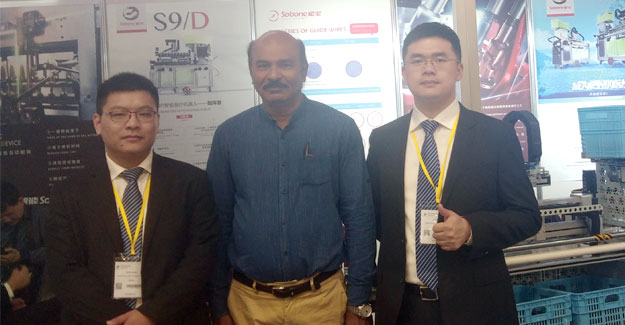
Sobone's Auto Doffing Robot Is A Solution For Rising Labour Costs
Tell us about your latest technologies showcased during ITMA. In this ITMA exhibition, we displayed: S9D AUTO DOFFING ROBOT: Compared with the old model that we introduced to our India customers earlier, S9D has a more humanised driving function, and it can further reduce the labour intensity of the doffing workers. At the same time, according to our ten years of developing and practicing experience, we optimised many details based on the origin, improving the using life of components, reducing the maintenance requirements. All-electric spinning frame modification series products: In the background of "Industry 4.0" trend, spinning frame will be digitalised in the future. If we want to make this, automizing the mechanical structure of spinning frame will be necessary. In this ITMA, we displayed Electronic Draft, Electronic Lift, Frequency Converter & other system solutions which can be used to modify various existing spinning frames and provide digital solutions for textile enterprises. Textile components: Sobone started its business in 1999 with textile components. We have been focusing on this field for 20 years. From this year, we applied a new environmental and abrasion-resistant surface treatment process, and launched a new high-performance and economical yarn guide wire. How was the response to your various products and automation solutions? Customers at ITMA exhibition were all attracted by the AUTO DOFFING ROBOT and had strong interests. Shortage of workers and reluctance of young people to work in spinning mills are not only the problem for China, but in mills across the globe. In this ITMA exhibition, most of the visitors came from India, they all have great interests in our AUTO DOFFING ROBOT. Any deals that were sealed at the show? We signed a deal with a well-known textile customer from Pakistan for our AUTO DOFFING ROBOT at our booth. Also our all-electric spinning frame modification solution and the textile components series that we exhibited got many intention orders. Can you elaborate on the automation trends in the textile industry in China? Due to rising labour costs in China, automation and intelligent machines are the most important topics for Chinese textile factories. The top enterprises are promoting the application of intelligent manufacturing and have already built model factories. Equipment with high speed, high quality, automation, short process, online monitoring, Internet of Things, big data and other properties are of great interest for Chinese textile companies. Chinese technology is usually faced with IPR infringement issues. How are you facing this challenge? To be honest, this may be a process of social development. Today's developed countries also experienced this process. The strength of intellectual property protection in different countries is also different. However, at present, intellectual property protection is becoming more and more strict in China, enterprises are paying more and more attention, they will not want to infringe on others' intellectual property and will also want to protect themselves at the same time, that's the opinion we have. Since the establishment of Sobone, we have been focusing on our own independent innovation. For example, for our AUTO DOFFING ROBOT, we have 100% intellectual property, we have invented this mobile doffing form from 0, and opened up a segment market. In fact, when we developed the Integrated Doffing programme more than ten years ago, we found the market didn't accept it because of the high cost. We didn't have any reference to develop the AUTO DOFFING ROBOT. We faced many hardships on our path to success, and today we enjoy the status of a market leader, a creator. Therefore, we will continue to innovate in the future, respecting originality and intellectual property, this is our policy. What impact have you felt from the US-China trade tensions? After the tax increase on textile products, it has affected the export of clothing, and along the chain it will impace us too. The pressure on the stocks of our customers is huge and it is expected that it will not improve in a short time. However, in the long term, I think we need to keep calm and do our best. Which are your main markets? What investment trends do you perceive in these markets? How is your business in India? Our main market is still Chinese domestic, and supplemented by overseas. Our main investment is based on research and development in the market. At present, we already have many representative AUTO DOFFING ROBOT customers in India. We have established agent channel, local service team and spare parts centre. We have the ability to provide timely and effective after-sales services. For the future, I hope we will help every customer one step at a time to achieve their success and improve the market by customers' feedback. Your views on how the BRI could help your business? Just a personal idea: Our concern is what our customers are thinking and what's happening in our industry. In our field, I know more about the investment of textile are transferred from seaside of China to Xinjiang (north-west area in China), including Southeast Asian countries, and BRI countries are the priority. I believe that BRI is very important for China's future development and it will create new opportunities and demands. The textile machinery market is global, so we will pay more attention and make decisions based on the actual requests and paces from customers.
Textile Excellence
If you wish to Subscribe to Textile Excellence Print Edition, kindly fill in the below form and we shall get back to you with details.












